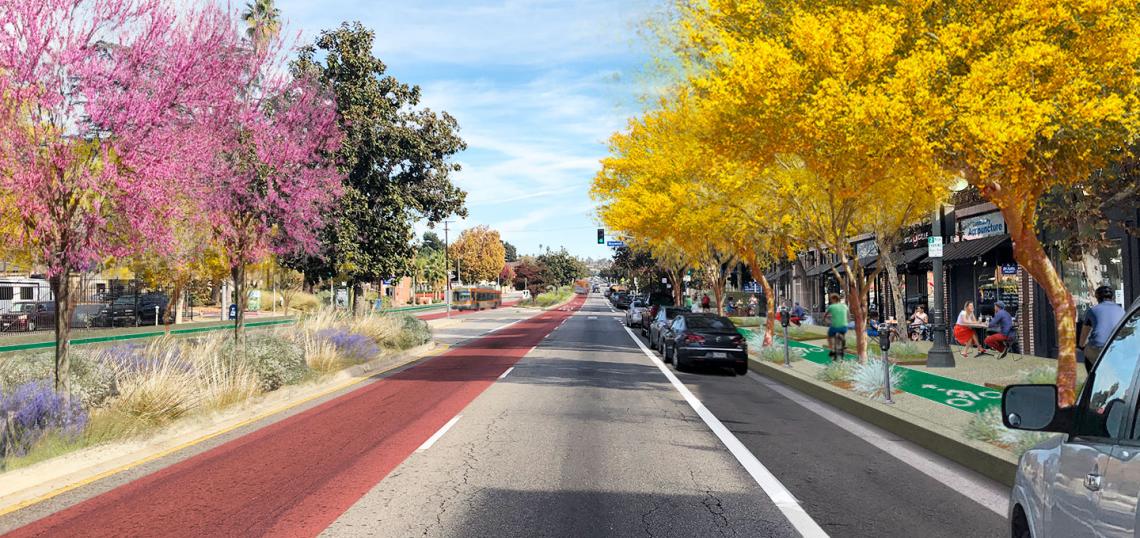Another universal basic income pilot program is coming to Los Angeles County.
At its meeting earlier this week, the County's Board of Supervisors voted to create a new program which will provide at least 1,000 residents monthly payments of $1,000 for a period of three years.
“Creating an equitable recovery from COVID-19 requires intentional investments in our most vulnerable communities to help end the symptoms of poverty, such as homelessness that have worsened due to the pandemic,” said Supervisor Holly J. Mitchell, who co-authored the motion creating the program with Supervisor Sheila Kuehl. “This is about effectively providing economic security for our residents who need the support. I commend the Board for making poverty alleviation a priority.”
“Guaranteed basic income can have deeply profound and positive impacts for low income families, providing stability and the means to pay bills, pursue additional education, and take better care of their health,” said Kuehl in a prepared statement. “Combined with local city efforts, LA County will host, in the aggregate, one of the largest guaranteed basic income pilots in the country with at least 4,300 participants. That positions the County to be a national frontrunner in rebuilding a thriving economy for all.”
The vote by the Board of Supervisors directs the County's Chief Executive Officer to develop an implementation plan for the program within 60 days. Potential target populations include transitional age youth, formerly incarcerated women, and survivors of domestic violence.
A smaller universal basic income program targeting low-income community college students has already been announced by the City of Long Beach.
Things to read from the past week:
AIDS Healthcare Foundation Buys Multifamily Building for $30 Million "The AIDS Healthcare Foundation purchased a 190-unit multifamily building in the Westlake/MacArthur Park area for $30 million...[the organization], according to CoStar, purchased the property with the intention to convert it into low-income housing." (LA Business Journal)
Governor Newsom Proposes $500M Bump to Active Transportation "Among his proposals was a one-time bump of $500 million to the Active Transportation Program. This is not as much as the California Transportation Commission had asked for, and is nowhere near the amounts allocated to other transportation programs, including $2 billion for highways; $1 billion for rail and transit; and another almost $2 billion for zero-emission transit and trucks." (Streetsblog California)
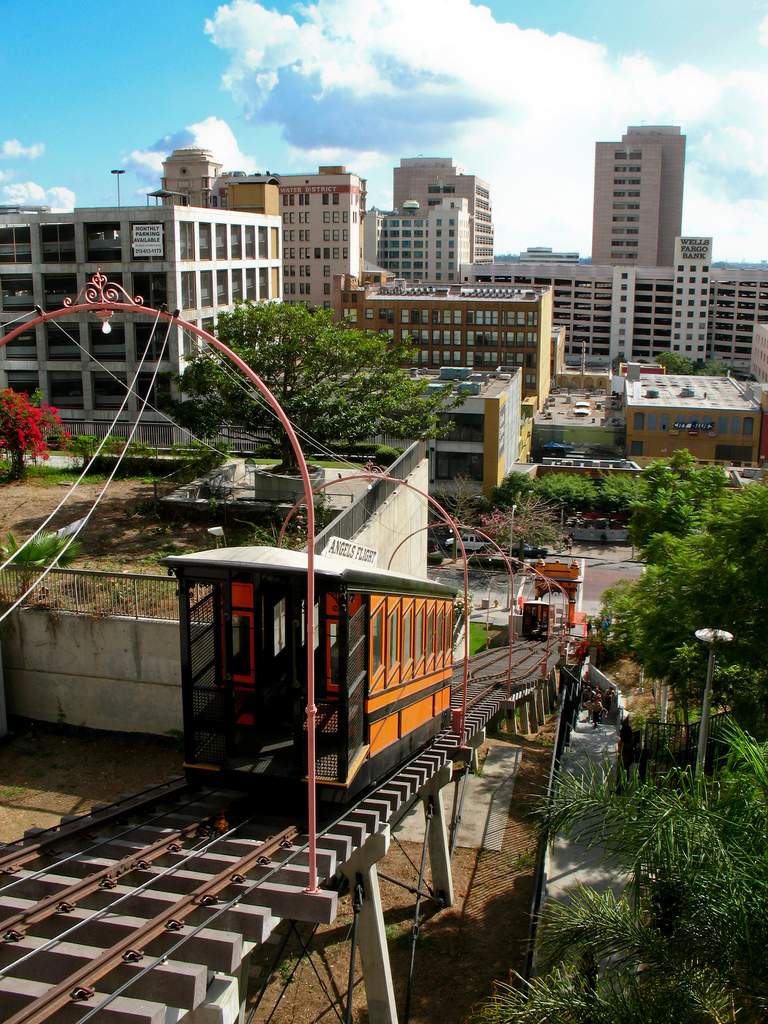 View of Angeles Flight looking east toward Hill StreetWikimedia Commons
View of Angeles Flight looking east toward Hill StreetWikimedia Commons
You know Angels Flight. But what about L.A.’s other funicular railways? "Angels Flight opened on New Year’s Eve 1901, the handiwork of Col. James Ward Eddy, a railroad man and an Illinois lawyer pal of Abraham Lincoln. You wouldn’t know it now, when the hilltop spine of downtown L.A. is the habitat of museums and performance halls. But before the vapid 'urban redevelopment' of the 1960s and ’70s decapitated the top of L.A.’s Bunker Hill as neatly as slicing off the top of a soft-boiled egg, there was a whole neighborhood up there." (LA Times)
101 Freeway Wildlife Crossing Gets A Major Boost From $25 Million Grant "The National Wildlife Federation announced Friday that philanthropist Wallis Annenberg and the Annenberg Foundation have made a $25 million conservation challenge grant to the federation's #SaveLACougars campaign to help break ground." (LAist)
How Parking Destroys Cities "Cars revolutionized transportation by promising not just speed, but autonomy. Cars let you go wherever you want, whenever you want, by yourself and by a route of your choosing. But that promise is fulfilled only if everywhere you might go has a place to store the car whenever you arrive. A train drops a passenger off and keeps going. A driver drops a car off and keeps going. Thus most trains are mostly moving, while most cars are parked most of the time. The price of the car’s convenience, then, is the space it consumes when it isn’t in motion, and indeed even when it isn’t there. Cities designed for cars must set aside space: space to wait for cars, and space to hold them while they wait for their drivers to come back." (The Atlantic)
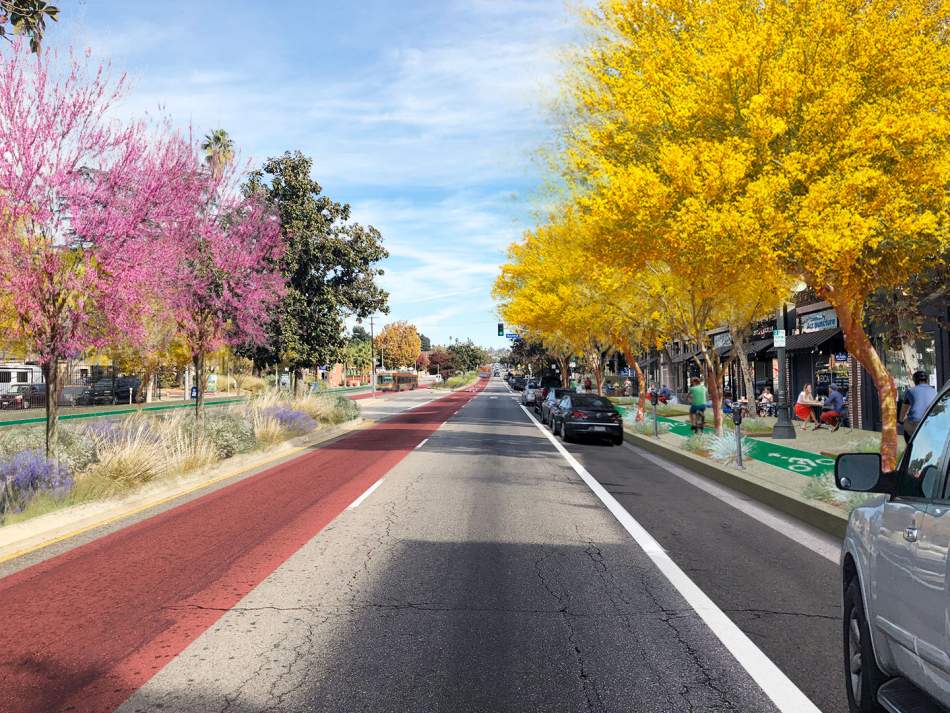 Rendering of proposed improvements to Colorado BoulevardBeautiful Boulevard Coalition
Rendering of proposed improvements to Colorado BoulevardBeautiful Boulevard Coalition
L.A. Times Editorial: Why is Kevin de León trying to stall a transit- and climate-friendly project in Eagle Rock? "Last week, the council member released a statement asking Metro to come up with another option that maintained two lanes of traffic in each direction and bike lanes, while attempting to restore medians and curb extensions. He also called for more in-person public hearings before Metro chose an option for Colorado Boulevard....In theory, there’s nothing wrong with more public discussion and analysis. But activists in Eagle Rock are understandably worried that the delay is an attempt to undermine the Beautiful Boulevard concept in favor of a car-centric view of the streets. That would be disappointing, considering how De León has touted his commitment to fighting climate change and his support for transit and safer streets." (LA Times)
Biden targets housing rules that hurt low-income earners. Will the suburbs buy in? "Amid a pandemic-fueled economic downturn and a single-family housing market boom that has largely been accessible only to higher-income earners, President Biden wants to create a $5-billion program to give grants and tax credits to local governments that start to eliminate exclusionary zoning rules." (LA Times)
Auto collisions plummet in pandemic, but fatalities increase "There were 35,654 vehicle collisions in the period that ran through March 14, 2021, a nearly 37% drop from the previous 12 months....Yet despite tens of thousands of fewer incidents, the number of road fatalities actually rose, to 257 from March 15, 2020-March 14, 2021, according to Los Angeles Police Department data. That is a 4.4% increase from the previous 12-month period and a 7% rise over the 240 reported four years ago." (Crosstown)
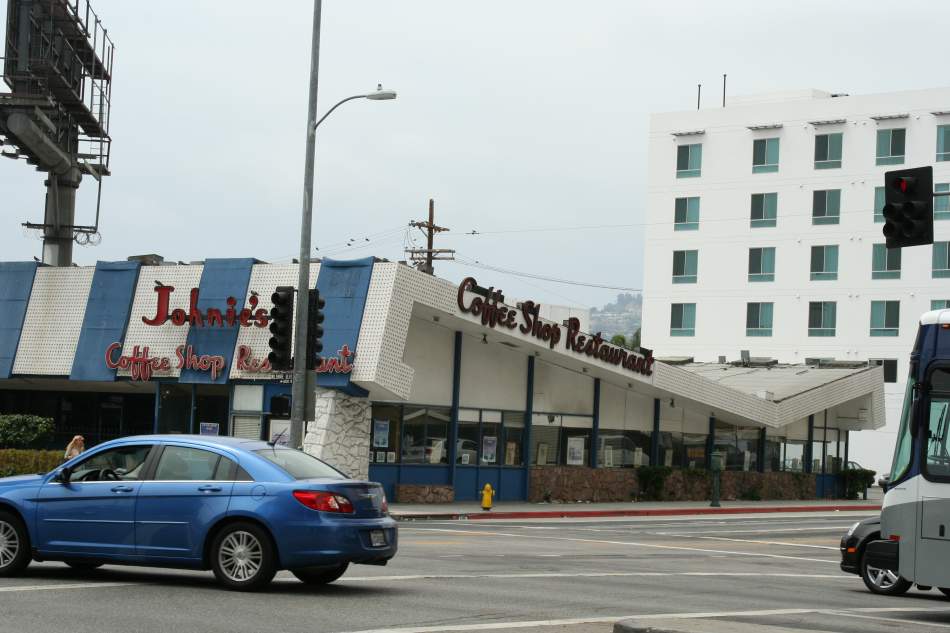 Johnnie's Coffee Shop at Wilshire and FairfaxWikimedia Commons
Johnnie's Coffee Shop at Wilshire and FairfaxWikimedia Commons
How Car Culture Shaped The Crazy, Cool Architecture Of Midcentury LA A non-ironic ode to gas stations, drive-thrus, and Googie architecture (LAist)
Metro Committee Approves Colorado Blvd for Eagle Rock Bus Rapid Transit "Metro’s NoHo-to-Pasadena BRT project will be a ~18-mile-long new line extending from the B/G Lines North Hollywood Station to the L Line in Old Town Pasadena. The project will span four cities: Burbank, Glendale, Pasadena, and Los Angeles. Steering the multi-city project designs to completion has been like herding cats, with various changes big and small requested by cities along the route." (Streetsblog LA)
Robert F. Maguire III, prominent developer who changed the L.A. skyline, dies "As a dominating figure in Southern California real estate during the commercial building boom of the 1980s and 1990s, Maguire used his clout to help save Los Angeles’ historic Central Library from demolition and was a civic leader who helped expand the Los Angeles County Museum of Art campus and stabilize its finances." (LA Times)
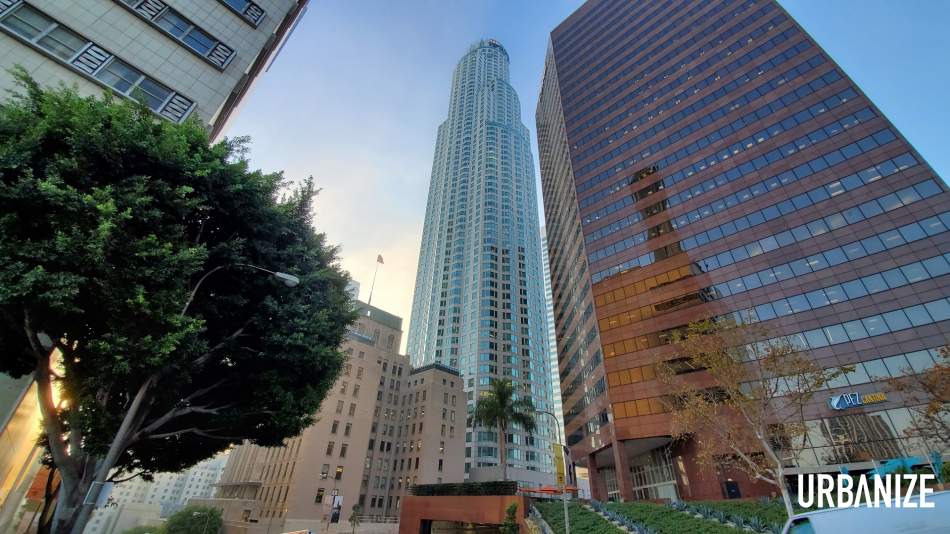 The US Bank Tower - developed by Robert MaguireUrbanize LA
The US Bank Tower - developed by Robert MaguireUrbanize LA
Koretz, LADOT Present Plans To Close Expo Bike Path Northvale Gap "Once the Northvale Gap section is completed, the Expo bikeway will extend nearly seven miles – from 17th Street in Santa Monica to La Cienega Boulevard in West Adams. That will be nearly all off-street bike path, though it does include a short stretch of on-street bike lanes from Motor Avenue to Palms Station. (The Expo bikeway also extends another five miles east of La Cienega to USC, all of which is on-street bike lanes.)" (Streetsblog LA)
New bike path to open along Port of Long Beach’s Pier J "The new Pier J Bike & Pedestrian Path will connect to the existing bike lanes that ended just south of the Queensway Bridge. It will now extend south of the Queen Mary on the port’s Pier J where new restrooms and observation platforms have been installed." (Long Beach Post)




